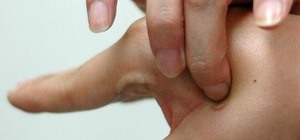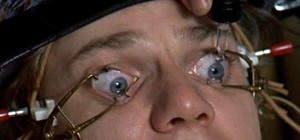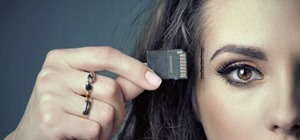Can you tell when someone is shooting you a fake smile? Even though fake smiles are easy enough to see through, we all still do it, attempting to show others just how happy we are when we're really feeling less than fantastic. Unfortunately, every smile we fake makes us a tiny bit more miserable.
Everyone Can Tell When You're Faking It
Think you're a pro at faking smiles? You're not as great as you assume. Chances are, everyone around you can tell when you're forcing a happy face. In researcher Eric Jaffe's study, the findings show that forced smiles are quite different from genuine ones—and it's easy to tell the two apart.

When a real smile takes place, the happy emotions we feel send a signal to our brains' left anterior temporal region. Once those positive feelings are received and recognized, two muscle groups react: our cheeks, which pull our facial muscles back and curl our lips upwards, and our eye sockets, which squint the corners of our eyes and create those little smile wrinkles.

When a fake smile takes place, the effects are slightly different. Rather than utilizing our cheek and eye socket muscles, other facial muscles are used to imitate their movement. Smiles that involve eye muscles, or full-face smiles, are difficult to force. Without actual happiness and emotion behind the smile, it fails to measure up—and often leaves our eyes out of the motion entirely.
Smiles Don't Always Make Us Happy
Plastering a fake smile on your face might make others think you're in a great mood, but it can't affect you in the same way. According to researchers LeeAnne Harker and Dacher Keltner, faking a smile is detrimental to our overall happiness. People who smile genuinely, even if they do so less often, report being more satisfied and happier with their lives.

Harker and Keltner found that there was a correlation between exhibiting positive emotionality—or, more simply, smiling—in yearbook photos and achieving a happier life. After examining the yearbook photos of college-aged women, the researchers discovered that those whose pictures featured real smiles with eye muscle movement married earlier, were more satisfied with their lives, and reported having better relationships than their fake-smiling counterparts.
What does a genuine smile have to do with this?
Negative emotions tend to limit our attention and motivate us to behave in specific ways, while positive feelings open us up. Generally, having a positive attitude and outlook leads us to see new connections, better integrate information, and solve problems in unique ways. Those who are more positive overall are more engaged socially and intellectually throughout their lives. Positive emotions, of course, lead to real smiles—and the more we experience genuine smiles, the happier our mood and outlook become.
Stop Faking Your Feelings
Although it's tempting to offer up a weak smile every time you meet someone new, or are greeted entering a store, cutting down on the number of fake smiles you hand out can better your mood.

If you're someone who slaps on a smile every time you talk to others, stick with your "normal" face. Smile when happiness hits you, not in an effort to look more pleasant and agreeable. Though you may not be a naturally "smiley" person, it's in your interest to express genuine emotions over falsified ones.
Remember, a natural, whole-face smile both represents your happiness and draws others to you. Besides, who wants to be spotted as a fake every time they crack a smile?
Essentially, there's more to smiling than simply looking good in a photo. Real smiles can make you a happier, more satisfied person with a lot to look forward to.
Just updated your iPhone? You'll find new emoji, enhanced security, podcast transcripts, Apple Cash virtual numbers, and other useful features. There are even new additions hidden within Safari. Find out what's new and changed on your iPhone with the iOS 17.4 update.























2 Comments
I tought fake smiles was bad in an healthy way with the title ^^
I learned that smiling, even if it's a fake, is good to perk up (according to science). Was it true ?
Then people with narcissistic and psychopathic traits (and almost entire cluster B personality disorders) would be healthiest people on planet.
Share Your Thoughts